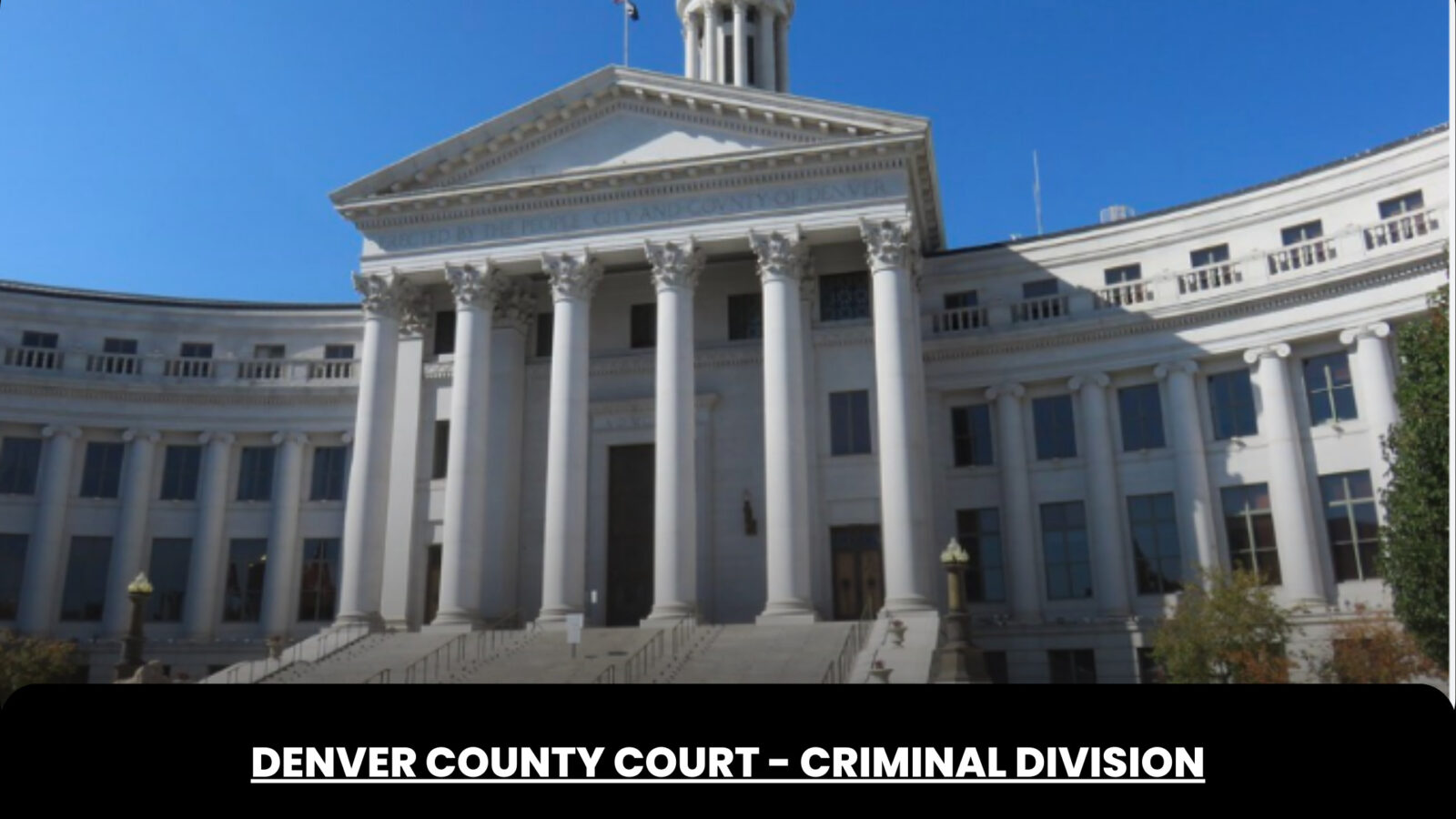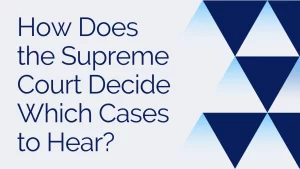Denver County Court – Criminal Division
Time
Working Hours:
Monday:
7:30 am–4:30 pm
Tuesday:
7:30 am–4:30 pm
Wednesday:
7:30 am–4:30 pm
Thursday:
7:30 am–4:30 pm
Friday:
7:30 am–4:30 pm
Saturday: closed
Sunday: closed
Connect with a Attorney
Denver County Court, situated in Denver, Colorado, is a significant judicial institution responsible for handling various types of cases. The court is divided into different divisions, each specializing in specific areas of the law. One of the prominent divisions within the Denver County Court system is the Criminal Division, which focuses on criminal cases and plays a vital role in the local criminal justice system.
Structure and Jurisdiction of Denver County Court
The Denver County Court is structured to efficiently handle a wide range of legal matters. The court consists of judges, prosecutors, defense attorneys, and other court personnel who collaborate to ensure fair and just proceedings. The Criminal Division within the Denver County Court system deals specifically with criminal cases, including misdemeanors and some low-level felonies.
Role and Functions of the Criminal Division
The Criminal Division of the Denver County Court is tasked with upholding justice in criminal cases. Its primary functions include hearing criminal complaints, conducting arraignments, and overseeing trials. The division plays a crucial role in safeguarding the rights of defendants while considering the interests of the community and ensuring public safety.
Court Proceedings in the Criminal Division
When a criminal case is filed, it goes through a series of court proceedings in the Criminal Division. The process typically starts with an arraignment, where the charges are read and the defendant enters a plea. Subsequent steps may involve pretrial hearings, discovery, plea negotiations, and, if necessary, a trial. Throughout the process, judges preside over the hearings, prosecutors present evidence, defense attorneys advocate for the accused, and defendants exercise their rights.
Sentencing and Penalties in the Criminal Division
Upon conviction, the Criminal Division determines appropriate sentences and penalties for the defendants. The court considers several factors, including the severity of the offense, the defendant’s criminal history, and any mitigating circumstances. Sentencing options can range from probation and fines to community service or incarceration, depending on the nature of the crime and applicable laws.
Rights and Protections for Defendants
The Criminal Division ensures that defendants’ rights are protected throughout the legal proceedings. These rights include the presumption of innocence, the right to legal counsel, the right to a fair trial by an impartial jury, and protection against self-incrimination. Defendants have the opportunity to present evidence, challenge the prosecution’s case, and appeal unfavorable decisions.
Resources and Support Services
To support defendants and their families, the Criminal Division provides various resources and support services. These may include access to legal aid organizations, victim support services, substance abuse counseling, and mental health programs. The court recognizes the importance of rehabilitation and offers programs aimed at helping individuals reintegrate into society after serving their sentences.
Case Management and Technology in the Criminal Division
The Criminal Division utilizes advanced case management systems and technology to streamline court processes. These systems enable efficient scheduling, document management, and data sharing, reducing delays and improving overall court operations. Technology also enhances public access to court information, enabling individuals to find relevant details about their cases and upcoming court dates.
Community Impact and Engagement
The Criminal Division actively engages with the community to foster understanding and collaboration. The court organizes outreach programs, educational initiatives, and public forums to promote awareness of the justice system and provide resources for citizens. By strengthening community engagement, the Criminal Division seeks to build trust and enhance the effectiveness of the criminal justice system.
Challenges and Reforms in the Criminal Division
Like any judicial institution, the Criminal Division faces various challenges. These may include caseload backlogs, resource limitations, and the need for ongoing training to keep up with evolving legal standards. To address these challenges, the division continues to implement reforms and innovative practices aimed at improving efficiency, access to justice, and fairness within the criminal justice system.
Denver County Court Case Search
Denver County Court provides an online case search tool that allows individuals to access information about their cases. The case search tool is a convenient and efficient way to find details such as case numbers, hearing dates, and case statuses. By entering specific information or case details into the search function, individuals can quickly retrieve the desired information related to their Denver County Court case.
Denver County Court Phone Number
To contact Denver County Court, you can reach out to their dedicated phone number. The court’s phone number serves as a direct line of communication for inquiries, general information, and assistance with court-related matters. By dialing the Denver County Court phone number, individuals can connect with court personnel who can provide guidance and support.
Denver County Criminal Records
Denver County Court maintains criminal records for cases within its jurisdiction. These records contain valuable information about criminal cases, including charges, convictions, and sentencing details. Access to Denver County criminal records can be obtained through various channels, such as the court’s online case search, in-person requests, or by contacting the court clerk’s office. It is important to note that certain records may be subject to privacy restrictions or redactions in compliance with applicable laws.
Denver County Court Virtual Court
In response to technological advancements and the need for remote proceedings, Denver County Court offers virtual court options. Virtual court allows individuals involved in court cases to participate in hearings, arraignments, and other legal proceedings remotely, using video conferencing technology. This virtual court system provides convenience, accessibility, and efficiency, while ensuring the continuation of court operations in a digital environment.
Denver County Court Clerk
The Denver County Court Clerk’s office is responsible for managing administrative tasks and providing support services to court users. The court clerk serves as a valuable resource for individuals seeking information about court procedures, case filings, and other related matters. The clerk’s office assists with document filing, record keeping, and can provide guidance on navigating the court system.
Denver County Traffic Court
Denver County Traffic Court is a specialized division within the county court system that handles traffic-related offenses and violations. Traffic court proceedings address issues such as speeding tickets, parking violations, and other infractions. Individuals with traffic-related cases can expect to have their cases heard in this specific division, which focuses on resolving traffic-related matters efficiently and fairly.
Denver Criminal Court Docket
The Denver Criminal Court Docket refers to the schedule of cases and hearings that are to be held in the criminal division of Denver County Court. The docket provides a comprehensive list of upcoming court dates, including arraignments, pretrial hearings, and trials. It outlines the order of proceedings and allows individuals involved in criminal cases to know when their cases will be heard.
Denver County Courthouse
The Denver County Courthouse serves as the physical location for Denver County Court. It is the central hub where court proceedings take place and where individuals can access court services. The courthouse is equipped with courtrooms, administrative offices, and support services necessary for the functioning of the court system. It provides a secure and professional environment for legal proceedings, ensuring justice is served.
Conclusion
The Denver County Court’s Criminal Division plays a crucial role in administering justice in criminal cases. It ensures fair proceedings, protects defendants’ rights, and considers the interests of the community. Through its structure, case management systems, and community engagement efforts, the Criminal Division strives to provide accessible and effective justice for all.
FAQs
1. What is the contact information for Denver County Court’s Criminal Division?
For contact information and general inquiries about the Denver County Court’s Criminal Division, you can visit their official website or contact the court’s administrative office.
2. How can I find information about my upcoming court date?
To find information about your upcoming court date in the Criminal Division, you can utilize the court’s online case search tool or contact the court clerk’s office for assistance.
3. Are court records in the Criminal Division public?
Yes, in general, court records in the Criminal Division are considered public records. However, certain sensitive information may be subject to redaction or restricted access based on applicable laws and court rules.
4. Can I represent myself in a criminal case?
While individuals have the right to represent themselves in court, it is generally advisable to seek legal counsel, especially in criminal cases. An experienced defense attorney can provide guidance, protect your rights, and navigate the complex legal process effectively.
5. What happens if I miss a court appearance?
Missing a court appearance can have serious consequences. It is important to contact the court immediately if you cannot attend a scheduled hearing. Failure to appear may result in a bench warrant being issued for your arrest or other penalties as determined by the court.







